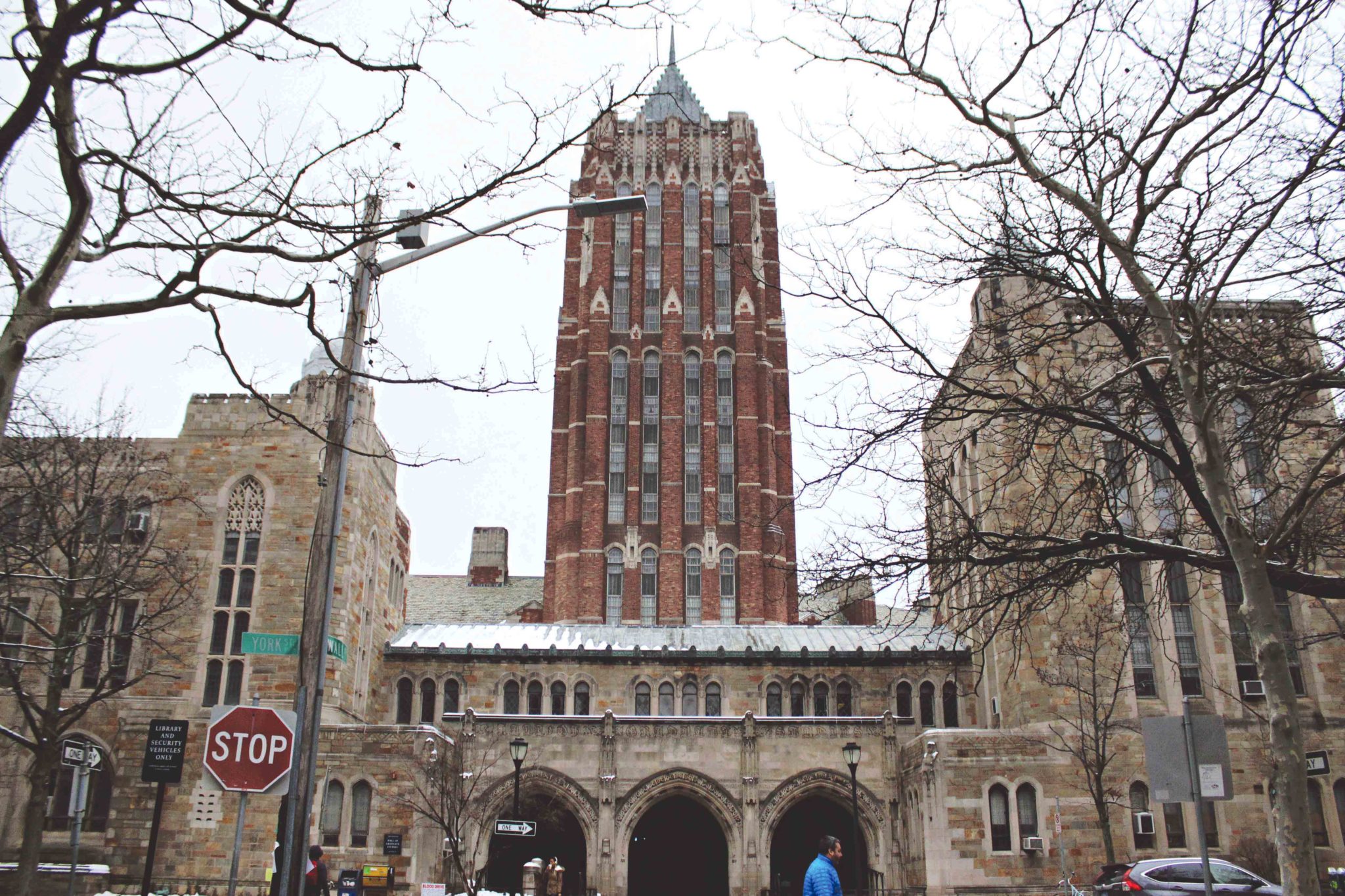
Yale Daily News
On Feb. 19, Lynn Cooley, dean of the Graduate School of Arts and Sciences, released a report containing suggestions for the future direction of humanities graduate programs at Yale, which is meant to address many of the programs’ long-standing issues.
The report was written by the Humanities Doctoral Education Advisory Working Group, which was first announced in May 2020 and consists of one faculty and one graduate student committee. Built on three key principles of innovation, inclusion and interdependency, the report focuses on six major domains: admissions, curriculum, dissertation, advising, teaching and program outcomes. The group’s recommendations included removing GRE requirements, implementing interdisciplinary programs with small cohorts and limited time horizons, and expanding students’ goals to include professions outside the traditional tenure track.
Faculty, administrators and students expressed mixed reactions to the report’s suggestions and implications: Some felt the report was a well-researched way to address some of the humanities programs’ issues, while others felt that the report was “addressing the wrong problems.”
According to Faculty of Arts and Sciences Dean of Humanities and co-chair of the faculty committee Kathryn Lofton, the final version of the report emerged after 99 drafts.
“Its creation is the point of the reform,” Lofton said. “The very way we created it is the reason why we wanted reform, which is students and faculty equally represented in the process of deciding how to structure the best possible horizon for doctoral education, period but specifically for us, humanities doctoral education.”
In an interview with the News, Lofton — along with co-chair and Graduate School Deputy Dean & Dean of Strategic Initiatives Pam Schirmeister, as well as student committee co-chairs Maria del Mar Galindo GRD ’22 and CJ Rice GRD ’22 — emphasized that although issues of inequity and access to graduate equation discussed in the report have been “enunciated” by the pandemic, those issues existed long before COVID-19.
Rice also said that the report was written in the context of “the crunch” of the academic humanities job market over the last 12 years.
“I understand this report should get tons of criticism, and I look forward to the debates that it will create in the departments,” said Lofton, who noted that bleak rhetoric about the humanities is a “political” choice. “But [the report] was an act by 20 people to invest in the very powerful intellectual hope of serious attention to sentences, to texts, to paintings, to the past. That has to be a thing that we commit to.”
The goal of tenure track placement
The report gathered data from doctoral students who matriculated from 2005 to 2010. The data was adjusted by overall attrition. According to the report, only 44 percent of matriculated doctoral students who entered graduate school between those years received tenure-track professorships, despite the fact that a majority of students entered doctoral programs in the hopes of finding such positions. The 44 percent average represents a large range of actual percentages across various humanities programs: 74 percent of graduates in East Asian Languages and Literatures received tenure-track faculty positions, while the same was true for only 14 percent of those in Renaissance Studies.
In response to these averages, the committee recommended reorienting students’ perspectives, helping them realize that such professorships are not the only option.
“I think in the humanities the public culture has been that the desired outcome is tenure-track academic placement,” Lofton said. “Our students are saying, yes, that’s what we want, but we also have other dreams and we’d like to be able to name those. So one of the points of the report was to try to get on the table, talking about other professional futures from the first year.”
The emphasis on a broader set of career paths is also intended to invite greater diversity and inclusion within doctoral programs, according to Lofton. By showing students the greater range of possible careers following a doctorate in the humanities, Lofton hoped that students with “a wide range of socio-economic and identity backgrounds” would be able to see graduate school as less of an economic risk.
More than just professorships
Lofton emphasized that the report does not recommend cutting programs. Rather, the working group hopes to help graduate programs pursue program outcomes that best suit student desires as well as lower rates of attrition. According to the report, attrition rates for humanities graduate programs averaged 19 percent for the data collected. The highest rate was 33 percent, in Slavic Languages and Literatures.
But for Orel Beilinson GRD ’25, “the only moral solution” is to accept fewer students into humanities graduate school programs. Beilinson rejected the idea that students would be happy to take on non-tenure-track positions and the premise that there are enough of these jobs that are both available and economically viable.
“We always speak about how important it is to develop this [alternative] route, but we don’t want to consider it for ourselves,” Beilinson said. “Especially at places like Yale, there is this atmosphere that, ‘Well I’m going to be the exception.”’
Because of this, for Beilinson, the report seemed like it was addressing the wrong problem.
“What do you prefer: Do you prefer to be told ‘no’ when you’re 21, and you can still go do something useful with your life, or do you prefer, which is the current situation, that people will say ‘no’ to you when you are 30, after you have lived … with student loans … on a $32,000 stipend for five to seven years?” Beilinson said.
History of science and medicine professor Bill Rankin disagreed, saying that reducing the number of graduate students would lead to a “death spiral” of cut programs, more conservative admissions and — as a consequence — less creativity within the humanities. Rankin acknowledged the mismatch between program outcomes and students’ desires for tenure-track jobs, but he hoped that such discrepancies could be solved by admitting students with more diverse interests outside of solely professorship positions.
Lofton also added that the FAS has already begun to further address the problem by prioritizing increasing the number of junior tenure-track hires and diminishing the number of senior hires at Yale. Tenure-track junior hires usually have not yet received tenure at any other institution, while senior hires generally join the University in a tenured position after previously receiving tenure at another institution.
“We understand that we’re a player in this market, but we are one player, and we hope to be a model — and through that model, yell to the land,” Lofton said.
Implications and responses
Galindo noted that the report — particularly with its emphasis on interdisciplinary study — encouraged faculty and graduate students to seek out innovative ways of looking at the humanities. This, she hoped, would help attract more interest in the humanities on an undergraduate level, consequently increasing the amount of humanities enrollment.
“There is a broader conversation about how universities can reject a move toward making academic positions more informal, more casual, more precarious,” Galindo said. “There’s a broader politics to how you improve those outcomes, a broader systemic reality. But — and I wholeheartedly believe this — if we begin to imagine implementing some of the options outlined in the report, if people begin doing different types of doctoral work, you know, in different areas of interest, that dynamism may also be part of how we transform our sense of how we need to value the humanities within the university.”
Galindo also noted that she hoped people who read the report overlook its resemblance to an “administrative product” and instead see the input of graduate students giving voice to their own experiences as Yale doctoral students.
Rice agreed, adding that the humanities are something that contain value within themselves, beyond any academic outcomes.
And for Beilinson, the intellectual reward of graduate school is important, but he believes that it can also be found elsewhere.
Although he believes that master’s programs are a good opportunity to do “something intellectually rewarding,” Beilinson maintains that doctoral programs are meant to be vocational training.
But Beilinson said that many of his peers do not feel the same way about the report and its recommendations.
Jacob Morrow-Spitzer GRD ’25, for example, found many of the suggestions helpful and convincing.
Although Morrow-Spitzer said that the report failed to address many of the immediate needs of graduate students — particularly issues that the pandemic has exacerbated, including loss of research opportunities and the lack of more complete health care coverage — he applauded the committee for their work.
“I think the report does a great job identifying some key challenges and issues within the current structure of humanities doctoral programs at Yale,” he wrote in an email to the News.
He added that the History Department’s Graduate Student Advisory Committee has already begun to discuss the implementation of certain changes recommended in the report, including graduate student representation in faculty meetings and an internal review process for certain department-specific courses.
Rankin similarly noted that the History of Science and Medicine Program plans to meet in a few days to begin discussing the report.
“It would be a real shame if this just became another report,” Rankin said. “There have been plenty of reports about the state of the humanities and the mismatch between supply and demand, or the crisis of the humanities, whatever you want to call it. … And I think that the departments and the division … need to be able to make good on this and actually do something besides just make some minor adjustments around the edges.”
The Hall of Graduate Studies has recently been renovated and renamed the Humanities Quadrangle, which is to house more than 15 humanities departments and programs.
Isabelle Qian | isabelle.qian@yale.edu









